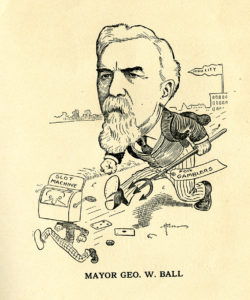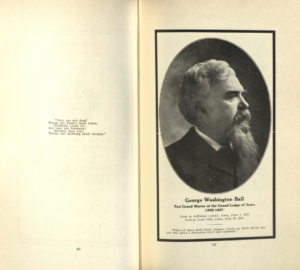

1904, July 12, Geo W. Ball, Newspaper Advertisement
George Washington Ball
George Washington Ball’s ties to the Iowa City Public Library can be traced back to its conception on the 12th of October, 1896. On that date, George Ball was selected to be one of the nine men to serve on the Board of Directors of the Iowa City Public Library Association.[1] By the 28th of October, Ball and his compatriots on the board had found and secured the lease of the Kenyon and Ham building, which was to serve as the first home of the Iowa City Public Library. He would continue to serve on the board until his election to mayor in 1905.[2] During Ball’s tenure on the board, the library would grow from its humble beginnings to occupy the beautiful neoclassical structure on South Linn that was built with the help of Andrew Carnegie.
George Washington Ball, born on June 7th, 1847[3], was a prominent member of the Democratic Party in Iowa. He served as a delegate and state house representative beginning in 1885. He also served as the county attorney for Johnson County between 1893 and 1896, and was a state senator for two terms beginning in 1899.[4]
Prior to his time in the Iowa State Senate, Ball attended Iowa Wesleyan University, and attained a law degree from what is now The University of Iowa. Ball was part of the first ever law class at the then State University of Iowa, graduating in 1869.[5]
His law career took him to short stints in Mount Ayr, Des Moines, and Chicago before returning to Iowa City in 1874. There, he married Esther Estella Walter on New Years Day of 1880. They had four children.[6]
After leaving the Iowa State Senate, George was a controversial Iowa City mayor and occasional dark horse gubernatorial candidate. He died on the 18th of July, 1915 and was buried in Oakland Cemetery in Iowa City.[7]
-Russell Buchanan
[1] Parker Lolly Eggers, A Century of Stories: The History of the Iowa City Public Library, 1896-1997, (IA City: Iowa City Public Library Friends Foundation, 1997), p. 9.
[2] Ibid., p. 122.
[3] Ancestry.com, Iowa, State Census Collection, 1836-1925 [database on-line], Provo, UT, USA: Ancestry.com Operations, Inc., 2018.
[4] Iowa State Bar Association, Proceedings of the Annual Session of the Iowa State Bar Association. 1910. Vol. 22, p. 22.
[5] Ibid.
[6] Ibid.
[7] Ancestry.com, U.S., Find A Grave Index, 1600-Current [database on-line], Provo, UT, USA: Ancestry.com Operations, Inc., 2018.
George Washington Ball
George W. Ball was one of the most active of the original 1896 board members, often hosting its earliest meetings in the offices of his law firm. He attended 83 of the 116 scheduled meetings during his eight years on the board. He left the board upon his election to the office of Iowa City Mayor in 1905.[1]
George Washington Ball was born 7 June 1847 near Fairfield, Jefferson County, Iowa. His parents, Smith & Rebecca Moffitt Ball, were natives of Kentucky, settling in Jefferson County, Iowa in the spring of 1840.[2] He attended Fairfield and Iowa Wesleyan Colleges before graduating from the University of Iowa Law School in 1869.[3] George practiced for a few years in Des Moines before setting up his law firm in Iowa City in November 1874. On January 1, 1880, George married Miss Estella Walker, daughter of Miles & Jane McDowell Walker in Warren County. Mrs. Ball was a graduate of Simpson College in 1876.[4] The couple had three sons; George Washington Jr, b. 1881 – Henry Moffitt & Walter McDowell (twins), b. 1883; and one daughter, Edith, b. 1887. George Jr worked in the library while a student and later joined his father’s law practice.[5] The elder George was active in politics serving the city council from 1881-1883, representative from Johnson County in the Iowa General Assembly from 1886-1887, state senator from 1900-1904, and two terms as Mayor of Iowa City from 1905-1909. Mr. & Mrs. Ball were members of the Methodist Episcopal Church of Iowa City and resided at 429 N Clinton St. All of their children were educated at Iowa institutions.[6] Their daughter married and moved to Washington State, but died on 30 March 1915, her father was grief stricken and declined steadily in his own health afterwards.[7] George Ball died 18 July 1915 and was buried in Oakland Cemetery, Iowa City.[8]
-Dr. Melissa Stewart
[1] Parker Lolly Eggers, A Century of Stories: The History of the Iowa City Public Library, 1896-1997, (IA City: Iowa City Public Library Friends Foundation, 1997), p. 51.
[2] Aurner, Clarence Ray, Leading Events in Johnson County, Vol. 2, p. 463.
[3] The Annals of Iowa, Vol. 12, Number 7 (1921), p. 552.
[4] Ibid, p. 466.
[5] The Daily Times, Davenport, Iowa, 19 July 1915, p. 8.
[6] Aurner, p. 466.
[7] Iowa City Daily Press, Iowa City, Iowa, 19 July 1915, p. 1.
[8] FIndAGrave Memorial #145117278.